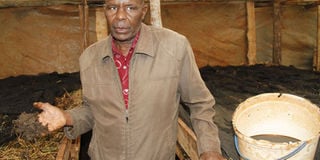My worms, my money

Peter Kanyagia at his Red worms farm in Ndenderu. July 12, 2014.Photo/JEFF ANGOTE (NAIROBI)
What you need to know:
- Vermicomposting is different from traditional composting, as it uses selected species of earthworms to help decompose and transform organic waste into useful compost.
- “When a farmer comes to me and buys 15kg of red worms, I advise them to let them multiply by feeding them for three to four months because they double every two months - 15kg of red worms will grow into 60kg in four months,” he says.
Not even the chilly July weather in Nairobi and its environs deters Peter Kanyagia from getting his hands dirty, as he sifts through heaps of compost to unearth his money-maker – red worms.
Rearing the worms might sound like a bizarre agribusiness venture, but Kanyagia is doing it to cut the use of fertiliser.
He stumbled upon the age-old farming technique of using red worms to produce organic compost five years ago.
After learning what the little creatures can do to boost yields, Kanyagia turned it into a money-making scheme. Vermiculture is the practice of rearing red worms.
His Kanyagia Vermicompost Farm is located in Ndenderu, on the western outskirts of Nairobi.
“I attended a one-day course on red-worm farming at the Jomo Kenyatta University of Technology where I developed an interest in keeping worms.”
After the training, Kanyagia started with five kilos of red worms, which he bought at Sh1,000 each.
“Red worms are used to convert waste into a humus-like material known as vermicomposting. All you need to do is feed the worms any kind of organic waste such as leaves, rotten fruits and vegetables and they digest and convert it into high quality organic fertiliser,” he says.
As worms feed on the organic matter and microorganisms in the waste, the ingested material is finely ground to produce manure.
“The microorganisms decompose the organic matter and stimulate mineralisation of complex compounds into simple nutrients, easily utilised by plants,” he explains.
Vermicomposting
Vermicomposting is different from traditional composting, as it uses selected species of earthworms to help decompose and transform organic waste into useful compost.
With traditional composting, the piles are mixed and aerated mechanically, but with vermicomposting, the earthworms mix and help aerate the waste.
“The goal of any farmer keeping worms is to continually increase their number to obtain a sustainable harvest.”
He sells a kilo of red worms at Sh1,000. He has 10 beds, each containing 20kg of red worms. In a good month, Kanyagia sells up to 200kg of worms to farmers and trains them in vermicomposting techniques.
The vermiculture bed is made of timber. The bottom is covered with a thick plastic or fibre sheets to hold and collect water. The bed should be 10 feet long, three feet wide and two feet high.
Before introducing the red worms, the bed should be watered adequately so that the moisture content inside is about 70 per cent.
To water the beds, one uses a can and pours the water on dry grass, which will drain into the manure, soil and the bedding materials.
“When you introduce the worms to their new home, they should be distributed evenly on the manure. The worms will disappear immediately inside the material,” explains Kanyagia.
“The next step involves feeding the worms. They will eat almost anything organic, from plants to animals. These include grass, weeds, manure, cow dung, bananas, stems, cabbages, and fruits.”
Kanyagia feeds the worms as follows. “One week with manure, and then the next week I incorporate fruit waste and the following week, fresh weeds cutting.”
Worms prefer to live in darkness because extended periods of sunlight can kill them. The best way to keep the worms in darkness is to provide a lot of dry grass on top of their bedding.
“Worms breathe through their skin, therefore, they must have a moist environment to live in. It is important to water but not drench the waste matter they feed on,” he advises.
“When a farmer comes to me and buys 15kg of red worms, I advise them to let them multiply by feeding them for three to four months because they double every two months - 15kg of red worms will grow into 60kg in four months,” he says.
One harvests the compost after four months, which comes in both liquid and solid form.
“To get enough vermicompost, it is recommended that you feed the worms for at least four months. This will allow composting to take place,” Kanyagia says. Before harvesting, the worms, a farmer should stop feeding them for two weeks to allow them time to process the unfinished material.
“After this period, you know how deep the worms are and you can remove or scoop all the worms with their bedding on top and transfer them to new bed.”
Mwangi Kibe, an agronomist at Egerton University’s Crop, Horticulture and Soil Sciences Department, says worms break down the crop residue into simple forms absorbed by the plant nutrients through the roots.
Unfortunately, because of applying chemical fertilisers, earthworms end up dying and decomposition of materials takes longer.
“The only challenge is that it cannot be done on a large-scale. Don’t throw away the compost, but put it in a bin and place your worms there and in a short while you have good compost,” says Kibe.
Farmers who use organic fertiliser will enjoy the long-term effects of increased soil humus.





